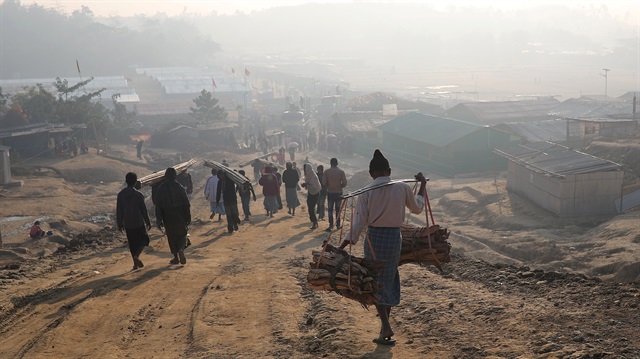

Rohingya refugees walk at Jamtoli camp in the morning in Cox's Bazar, Bangladesh, January 22, 2018. REUTERS/Mohammad Ponir Hossain
Bangladesh and Myanmar should reconsider repatriation deal, says Rohingya advocacy group
Rohingya refugees continue to flee persecution in Myanmar but Bangladesh is preparing to send them back despite deep concern among the international community, according to a Rohingya advocacy group.
“The repatriation deal is a nightmare for all Rohingya genocide survivors who fled to Bangladesh. We are deeply concerned about it,” Hla Kyaw, chairman of the European Rohingya Council, told Anadolu Agency.
He said Rohingya refugees currently taking shelter in Bangladesh “should never be returned to the killing fields before their safety, security and citizenship are guaranteed."
The bilateral deal, signed on Nov. 23 last year, stipulates some nearly impossible conditions for the verifying the residency of the people the agreement calls "displaced persons from Myanmar" instead of their widely known ethnic identity of Rohingya.
Though Tuesday is the deadline to start the repatriation, the process seems likely to take more time as many issues are yet to be finalized.
Right groups including Human Rights Watch, the UN Refugee Agency and Amnesty International have voiced their concern over the deal, saying it would send Rohingya back to the brutality in Myanmar.
Amnesty called the plan “alarmingly premature” while HRW called on both governments to redraft the agreement involving the United Nations High Commissioner for Refugees.
Earlier this month, Bangladesh and Myanmar finalized an agreement on the physical arrangements for the repatriation of the Rohingya and agreed to send 100,000 Rohingya to Myanmar in the first phase.
The process will take some time with Myanmar agreeing to accept 1,500 Rohingya per week with the goal of taking back more than 700,000 within two years.
The Rohingya will first be placed in a “temporary camp” under Myanmar’s control and then settled in a locality.
“They should be returned to their original homes. Their homes must be rebuilt,” Kyaw said, noting that most of the Rohingya villages had been burnt down.
“The deal has not addressed any basic human rights. Bangladesh is trying to just send them back,” he added.
He highlighted that the people are still fleeing from the region, adding that “people are being arrested on a daily basis."
“No Rohingya are willing to go back unless their safety is guaranteed because they have witnessed atrocities committed by Myanmar’s security forces. It seems that Bangladesh is trying to return them forcefully.”
He said a forced return will result in a new influx of refugees within a few years.
"Myanmar’s military will launch another operation after a few years unless the international community takes concrete actions against Myanmar.”
C.R. Abrar, coordinator of the Dhaka-based Refugee and Migratory Movements Research Unit (RAMMRU), echoed Kyaw’s concern while noting that Bangladesh’s government has been working to ensure some aspects of the deal.
“A discussion should be held with Rohingya. Their concerns should be taken into account. But as you know, Bangladesh’s government has also voiced the same concerns and called on the Myanmar government to ensure their safety and other issues,” he said.
He noted that Dhaka is carrying out a very “tough task” and called on the international community to engage with and support the process.
"The important issue is to ensure some international scale of basic rights of Rohingya people. For this, the international community should come forward and work on the issue. This is not only a responsibility for Bangladesh. The international community also has a responsibility.”
Abrar also noted the repatriation could not be started by the deadline.
“It is a process. The process has been started, but delays can occur in any process.”
“The government should not be rushed. They should ensure an environment where the Rohingya people can return in dignity and other issues, including clarifying the duration of their stay in a temporary camp and international monitoring.
"If they are sent without doing all these things, they cannot stay there. They will come to Bangladesh again, as it happened in 1991-1992."
Bangladesh’s Foreign Minister A. H. Mahmood Ali said Sunday that Dhaka “has put its best efforts to ensure that the agreements facilitate a safe, voluntary, dignified and sustainable return."
"In order to ensure that the return is voluntary, Bangladesh has incorporated provisions for involvement of the UNHCR and other relevant international organizations in the entire return process," he added during a briefing to foreign envoys in Dhaka, according to a press release from the ministry.
The Foreign Minister also mentioned that Bangladesh tried to create space for international actors in every phase of the return, resettlement and reintegration.
He did not provide a specific timetable for beginning the repatriation physically but only mentioned that the process is ongoing.
The Rohingya, described by the UN as the world's most persecuted people, have faced heightened fears of attack since dozens were killed in communal violence in 2012.
More than 650,000 refugees, mostly children and women, have fled Myanmar since Aug. 25, 2017 when Myanmar forces launched a crackdown on the minority Muslim community, according to the UN.
At least 9,000 Rohingya were killed in Rakhine state from Aug. 25 to Sept. 24, according to Doctors Without Borders.
In a report published on Dec. 12, 2017, the global humanitarian organization said the deaths of 71.7 percent or 6,700 Rohingya were caused by violence. They include 730 children below the age of 5.
The UN has documented mass gang rapes, killings -- including of infants and young children -- brutal beatings and disappearances committed by security personnel. In a report, UN investigators said such violations may have constituted crimes against humanity.
#Bangladesh
#Myanmar
#repatriation deal
#Rohingya
#Rohingya refugees




